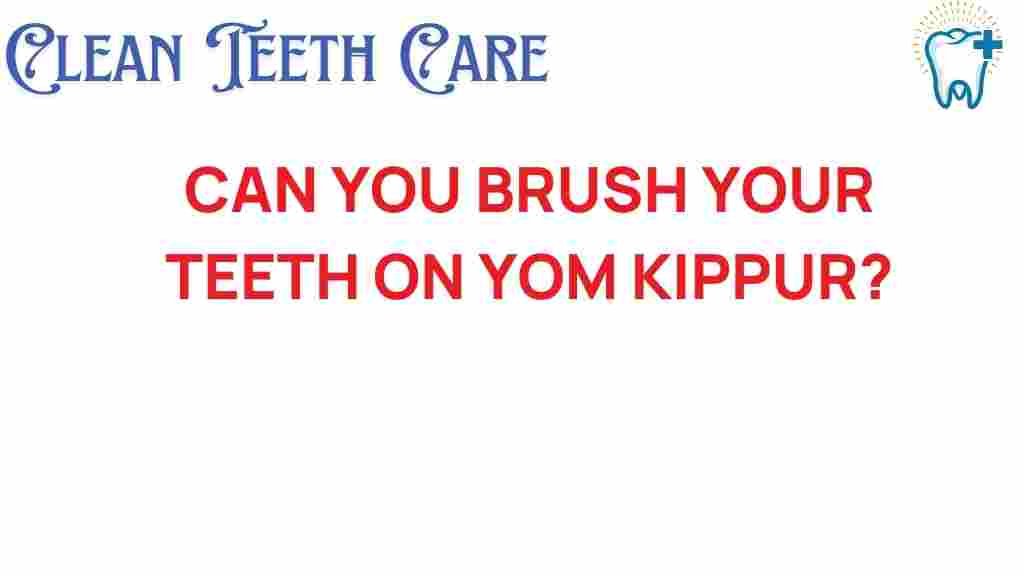The Surprising Debate: Can You Brush Your Teeth on Yom Kippur?
As Yom Kippur approaches, many individuals begin to reflect on their religious practices and the customs that make this day so significant. One common question that arises, particularly among those concerned with oral hygiene, is whether it is permissible to brush your teeth while fasting. This article delves into the intersection of Yom Kippur, oral hygiene, and health, exploring the beliefs and traditions surrounding this important day in the Jewish calendar.
Understanding Yom Kippur
Yom Kippur, also known as the Day of Atonement, is the holiest day in Judaism. It is a time for reflection, prayer, and fasting, where individuals seek forgiveness for their sins and strive to improve themselves spiritually. The fast lasts for 25 hours, beginning at sunset and ending the following evening. During this time, many traditional practices are observed, including abstaining from food and drink.
The Importance of Oral Hygiene
Oral hygiene plays a crucial role in maintaining overall health. Regular brushing and flossing help prevent cavities, gum disease, and other dental issues. However, during Yom Kippur, many individuals find themselves in a quandary—how can they maintain their dental care routine while adhering to the fast?
The Debate: To Brush or Not to Brush?
The question of whether one can brush their teeth on Yom Kippur is a complex issue that involves understanding Jewish law and customs regarding fasting. Here are some key points to consider:
- Halachic Perspectives: Different rabbinical authorities interpret the laws of Yom Kippur differently. While some permit brushing teeth, others advise against it.
- Health Considerations: Maintaining oral hygiene is important for overall health, and neglecting it could lead to dental problems.
- Tradition vs. Modernity: Some traditions emphasize strict adherence to fasting rules, while others adapt practices to modern health needs.
Step-by-Step Process: Brushing Your Teeth on Yom Kippur
If you choose to brush your teeth on Yom Kippur, here is a step-by-step process to do so while being mindful of your religious practices:
- Consult Your Rabbi: Before making any decision, it is advisable to consult with a rabbi to understand the specific laws and customs that apply to your community.
- Use a Dry Toothbrush: If permitted, consider brushing your teeth without toothpaste to avoid swallowing any substances.
- Rinse with Water: If you wish to rinse your mouth, do so with a minimal amount of water to prevent accidental ingestion.
- Be Mindful of Intent: Ensure that your intent is to maintain oral hygiene and not to break the fast.
- Limit Frequency: If allowed, limit the number of times you brush to minimize the risk of swallowing anything.
Troubleshooting Tips for Maintaining Oral Hygiene
For those who decide against brushing their teeth on Yom Kippur, here are some alternatives and tips to maintain oral hygiene:
- Flossing: If you feel comfortable, flossing can help remove food particles without the need for a toothbrush.
- Mouthwash Alternatives: Use a mouth rinse or water before the fast begins to freshen your breath.
- Stay Hydrated Before the Fast: Drink plenty of water and maintain good hygiene in the days leading up to Yom Kippur.
- Chew Sugarless Gum: Chewing sugarless gum before the fast can help stimulate saliva production and reduce bacteria in the mouth.
Health Implications of Fasting
Fasting on Yom Kippur is not only a spiritual practice but also has implications for health. Here are some health considerations to keep in mind:
- Hydration: Ensure you are well-hydrated before the fast begins, as dehydration can affect oral health.
- Dental Check-ups: Schedule regular dental check-ups to ensure your oral health is maintained throughout the year.
- Listen to Your Body: If you experience discomfort or health issues during the fast, it is essential to seek medical advice.
Cultural and Religious Significance
Yom Kippur is rich in customs and beliefs that have been passed down through generations. Understanding these practices enhances the experience of the day. Some key aspects include:
- Prayer and Reflection: The day is dedicated to prayer, reflection, and seeking forgiveness from both God and fellow humans.
- Community Involvement: Many people gather in synagogues, fostering a sense of community and shared experience.
- Breaking the Fast: After the fast, families often come together to break the fast with a meal, reinforcing community bonds.
Conclusion
The question of whether you can brush your teeth on Yom Kippur is a nuanced one that reflects the broader tensions between religious observance and personal health. While some authorities may permit it under certain conditions, others may advise against it. Ultimately, the decision lies with the individual and should be made with careful consideration of both faith and health.
As you prepare for Yom Kippur, take the time to reflect on your beliefs, customs, and the importance of oral hygiene in your life. Remember, maintaining good dental care is part of caring for the body, which is also a vital aspect of one’s spiritual journey.
For more information on Jewish customs and health practices, you can visit this resource. And if you’re looking for tips on maintaining oral hygiene throughout the year, check out this guide.
This article is in the category Hygiene and created by CleanTeethCare Team
